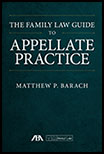Learn to embrace questions from the appellate court: those questions provide an opportunity to validate your arguments. Here are 9 tips for handling questions, avoiding bad answers, and dealing with difficult judges at oral argument.
By Matthew P. Barach, Family and Appellate Lawyer
A. Be Ready to Navigate the Appellate Court’s Questions

Always answer the question you are actually asked. Listen and focus on exactly what the appellate judge is asking to effectively answer his or her question. From one former chief justice:
If you are going to be able to intelligently answer a question, you must first listen to the question. It is surprising how often appellate advocates, just like many people in private conversation, seem to hear only part of the question, and respond to that part of it that they had heard even though the answer they give may not be an adequate response to the entire question.[1]
How do you specifically handle questions at oral argument?
Respond with a “yes” or a “no.” If necessary, explain further. For example, “Yes, Your Honor, but in this matter the wife is capable of working full-time, which contrasts with…” Or: “No, Your Honor, unless we take into the history of earnings of the parties, which the trial court did not address, then…”
The point is you want to provide a “yes” or “no” answer for the appellate court followed by an explanation if necessary. Do not give an explanation first!
B. Some Answers To Avoid
There are some forms of answers to avoid when you are before the appellate court. Here are two major responses to steer clear of when you argue:
1. Avoid overhyping a response.
Do not engage in hyperbole. For example, “This is the greatest injustice in the history of the probate court system.”
2. Do not praise the appellate court for a question.
Refrain from praising the appellate court for thoughtful questions. For example, “You know, Your Honor, that is an excellent question.” You are likely to be excited when you have anticipated a question and want to praise the appellate judge for asking what you are thinking. But your attempt at flattery may fall flat or even be offensive to a panel of hardened appellate judges.
C. Hypotheticals
Hypothetical questions are asked at oral argument. Learn to embrace the hypothetical – even when it is off the wall. Try the following:
“Yes, I agree the husband should not have to pay alimony after he has passed away, but that is not the case in the present matter.”
As you prepare, ask yourself your own hypothetical questions to apply to your argument. By developing your own hypotheticals, you are able to handle these forms of questions from the appellate panel.
D. Unknown Answers
What if you do not know an answer to a question? If you do not have an answer to a question, it is better to be honest and acknowledge your inability to answer the question. Try the following:
“I am sorry, Your Honor, but I do not know the answer. If it is acceptable to the court, I will provide the information by letter this afternoon.”
Another acceptable approach would be:
“Your Honor, I do believe the answer to the question is yes; however, I am not entirely certain on that point.”
Never guess. Never even try to guess. Be direct and candid with all of your responses to the appellate court – even those you do not know!
E. Be Flexible
Be flexible and be ready to adapt to what you are confronted with at oral argument. Never expect to “argue” your points in sequential order. Expect the unexpected and be prepared to go where the appellate court leads you.
Be prepared for all of the following:
- To speak with interruptions from the bench.
- To speak without interruptions from the bench.
- To speak with a limited number of questions.
- To speak with a limitless number of questions.
Have a game plan for all of these scenarios. Make your points regardless of the style of panel, and be prepared to adapt to the appellate panel you are facing.
F. Never Postpone an Answer to a Question
Never do the following: “Your Honor, I’ll address it later in my argument. Let me start with the issue of child support and we will return to custody later…”
Judges want answers to the question they are asking you now.
View oral argument as if you are there to serve the appellate panel; you are the waiter or the waitress serving up your logical argument to the hungry patrons on the appellate court.
Advocate for your client by providing the appellate panel with direct responses to the information being sought. Your answers are your advocacy.
The problem with being nonresponsive is it causes the appellate panel to think you lack an answer. It diminishes your argument.
Address all questions from the panel. Go where the court wants you to go!
In summary, learn to embrace questions from the appellate court. Treat questions from appellate judges as your opportunity to validate your arguments. Your answers resolve issues troubling to the appellate judges and remove ambiguity with your argument. Questions confirm that appellate judges are paying attention.
G. Types of Judges/Panels
Appellate panelists come in all shapes and sizes. Some are extraordinarily active while others are downright passive. Understand all the types of jurists you may encounter in your arguments.
Sometimes you encounter a recalcitrant appellate court judge whose questions are designed to demonstrate to the other panelists the weakness of your case. Hence, the difficult judge – so let’s start there.
H. How to Handle a Difficult Judge
How do you handle the difficult judge?
- First, display belief in your arguments. Be steady. Do not quiver, shake, or fidget. You can do this. Think of your client and why you are there. Stay focused upon making your argument.
- Look the judge square in the eye and respond in a professional, but firm manner.
- Recall your theme. Make your points in the context of the appellate judge’s questioning.
- As Desmond Tutu said, “Don’t raise your voice, improve your argument.”
What do you do when the difficult judge repeatedly asks you the same question over and over again?
You do not want your time killed with the appellate panel, so use a polite way to get out of the repetitive loop. Consider trying the following:
“Your Honor, I believe the answer would be the same and I am unable to add anything further in response to your question. If I may, I would now address the issue of the husband’s alimony…”
Likewise, a judge may be focused on only one part of your presentation and time begins to grow short for you to address other critical areas of your argument you want to highlight. When that happens, you must turn the appellate court’s attention directly.
Remain polite but assert some control to get your argument back on the right track. Try the following – but only after responding to the last question: “With the court’s permission, I would like to turn now to…”
Remind yourself that it is your argument.
I. When Only One Point Is Necessary for Your Oral Argument
Never feel pressured to make all three points of your argument when only one major point is necessary. If it is necessary, explain to your client that the appellate court was focused on only one of the issues you had briefed. Thus, your other two points were made in your written submissions and are under consideration before the appellate court.
[1] Scalia & Garner, “Making Your Case” 191 (quoting Hon. William H. Rehnquist).

The founder and principal of Barach Family Law Group in Massachusetts, Matthew P. Barach is a family law trial attorney and appellate family law specialist. www.barachfamilylaw.com
Related Articles
Part 2 of this article, “Preparing for Hostile or Aloof Appellate Panels at Oral Argument“, is available here:
www.familylawyermagazine.com/articles/preparing-for-hostile-appellate-panels-at-oral-argument-part-2
To Appeal or Not to Appeal
You have fought the good fight – but despite your best efforts, the trial court did not award all that your client desired. After the dust settles, what, if any, next steps should be taken?
A Tale of Two Family Law Appeals
For the family law practitioner, these cases illustrate the importance of creating and “protecting” the record in the course of a trial or other evidentiary hearing. And on a close issue, more evidence is generally better than less.







